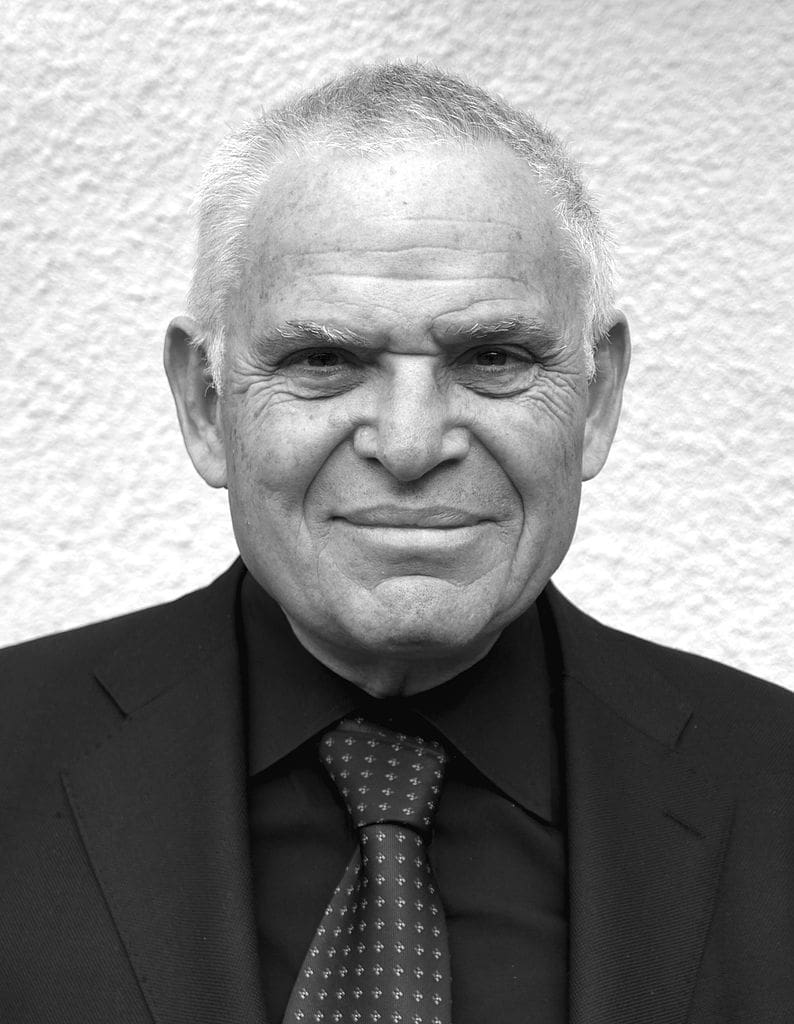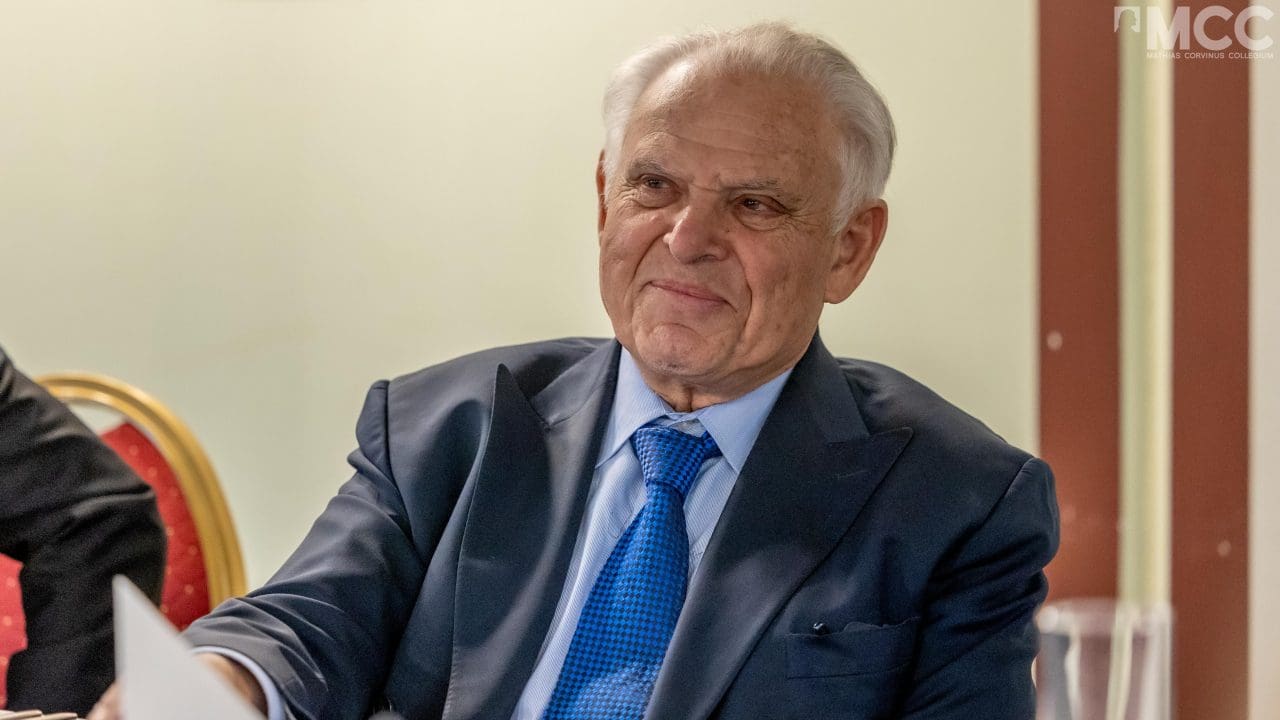Edward N. Luttwak is a world-famous American writer born in Arad, Romania in 1942. He is an expert in military strategies, international relations, geoeconomics, and military history. He graduated from the London Schools of Economics and John Hopkins University, where he gained his PhD in 1975. He served for a few years in both the British Armed Forces and the Israel Defense Forces. In the United States, he worked as a consultant for the US Department of Defense, the US Army, the US Navy, and the National Security Council. In the 1980s, he became a security adviser to the White House. His books have been published in more than twenty languages, Coup d’État: A Practical Handbook from 1979 was also published in Hungarian. The Logic of Peace and War is included in the curriculum at several military academies. In May, he visited Hungary at the invitation of the Danube Institute. During his visit he participated in the round table discussion organised by the Danube Institute and the National University of Public Service entitled The Easy Military Questions, the Hard Cultural Question.
You have emphasised, since the beginning of the Russo-Ukraine war, that plebiscites are the ’only available exits’ from the war. You used the phrase ’plebiscite’ to refer to the 1919 rules that were laid down in the Peace Treaty of Versailles. Do you still consider it a tangible and realistic solution? Could you explain the main elements of this process?
Well, the 1919 plebiscites occurred in much more difficult conditions than today. The First World War just ended, and the states involved were completely new, like Hungary, Austria, and Poland. The Spanish influenza epidemic was also raging on at the time. So, conditions were very, very difficult, and there was no internet, no easy way to collect data. Nevertheless, in each case, from the Belgian to the Danish, from the Hungarian to the Polish, there were violence, tension, and the threat of more fighting. However, the plebiscites ended them completely. So, if the plebiscite formula was successful under 1919 conditions which were so much more difficult, it can succeed more easily now. It should be mentioned that the requirements were extremely demanding. First of all, certification of voting was done by birth certificates, or other documents, such as a bill. By 1919 already, some people had utility bills showing that they had been living there before the war. Bookkeeping work and documentation work required a lot of people’s contributions. The plebiscites were arranged with many neutral observers. So, if the plebiscite worked in 1919, it could work very easily today. The second thing is that the plebiscite gives everybody a political door out. That’s why I’ve been thinking from the first day that the only exit from the burning theatre is the plebiscite.
Based on a geopolitical point of view, does the overall European military policy make sense? In your opinion, in the current situation, when the fixed conditions of a post-war era are not predictable, how could one adequately prepare for them? I’m interested in it, especially from a European perspective.
Well, the European perspective is that nobody in Europe is serious about building a European army. To be honest it’s very difficult to be the Minister of Defence if you don’t have a live enemy at your border. What’s the justification for spending any money on the armed forces, if you aren’t planning any war and nobody is threatening you? Personally, I would follow the Israeli model. According to the Israeli theory, military activity in Japan, for instance, has no relevance, unless there is a need to respond to real problems.
So, threat-based defence policies will result in reduced spending.
As a consultant, I’ve always taken that position: responding to actual threats is the Defence Minister’s job. If there are no actual threats, there is no reason to do much beyond maintaining institutions. Otherwise, I believe that one should not take the initiative in everything in life, except threats. One problem is the trade union pressure on the military profession. At the same time, it is my firm conviction that if there’s a threat, your population will be willing to serve in the military, so if you don’t have professionals, the population will be more involved. Thus, in the end, you have a big army, and it doesn’t cost a lot.
Is it possible to end the war and agree on contentious issues without setting ourselves up for a future conflict?
Historically, wars are coups d’états in the interior of the political process. It’s usually invisible to outsiders and it usually doesn’t respond to outside activity. The war in Ukraine started with people who are non-historians reading the history of Russia, the way a non-historian is looking for something relevant today. So, whenever they think that they have some historical information, it’s always misinformation because it gets taken out of context. The people in Washington could not imagine anything about Kyiv. And the Kyiv people couldn’t understand anything about Moscow, and so on. The moment you have a rival power, one thing that happens immediately is that information disappears.

When the Germans went to war against the British in 1939, information about the real nature of Germany disappeared in London, and information about London disappeared in Berlin. As for Rome at that time, it was governed by people who were anti-realist idealists who believed if you say something, it will happen. Mussolini was one of the few Italians who knew that the victory for Italy was nothing more than business. Italy actually lost the war, but the British didn’t have passage to the Suez Canal, while the French, on the other hand, were insecure in North Africa. In conclusion, power is something that is attributed from outside, there is a very poor relationship between the actual action and power. That’s why I say national politics is much more rational. In national politics, people know each other, but in international politics, they usually do not. In 1982, when the Argentinians took the Falkland Islands, nobody understood why the British would try to reverse the loss by mounting an impossible military operation. A military operation that was 90 per cent guaranteed to fail. They sent ships 12,000 miles away from Southampton without air cover. Nobody in Washington understood why the Royal Navy was risking its public support. They both spoke English, although they couldn’t even understand what they were disagreeing about.
In your opinion, what is a good strategy for Hungary in this new geopolitical situation?
First of all, Hungary is a country surrounded by ‘dwarfs’ geopolitically. In other words: Hungary is in an island condition, strategically speaking. That’s why I say, Hungary should not spend much money on defence, so that it can reshuffle money to other things, like secondary education. Increasing the educational level of the population in a vertical expansion raises the level of high schools, which can be a basis for world-class universities. I’m amazed that governments around the world don’t understand the simple fact that
the only place where you can actually uplift your country is high school. Not universities, not primary schools, high school.
For example, Japanese high school professors are highly respected, and not just in Tokyo. When they go into a restaurant, people stand up and invite them to their tables.
As far as I know, you have Transylvanian roots…
My roots are in Bánát (Banat). I was born in Arad, that’s my first stroke of luck. My mother was well-read in Russian, French, German, and Hungarian literature, and my father was a kind of business genius. The Jewish community in Bánát was really dedicated to culture, and was also highly international. The high schools in Arad and Temesvár (Timișoara) were as good as the ones in Budapest, which meant they were world-class schools. My second stroke of luck is that I went to elementary school in Palermo, where I learned the logic of violence. I learned, first of all, to respect violence, to appreciate violence, and to see it as a positive asset. So, I learned this in the streets of Palermo. You can’t learn it anywhere else. Then, because I was kicked out of schools in Milan, I went to college in England. Compared to my secondary education, my university education at the London School Economist was short. Secondary school is everything. Again, I’m amazed that many governments don’t understand that it is ‘gimnasiums’ where they should put all their money, not universities.
Related articles:








